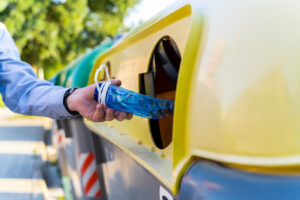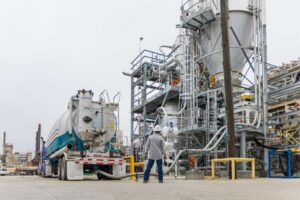
Letter
Colorado Producer Responsibility Advisory Board Letter for Implementation
Delivered via email: [email protected]
Dear Colorado Producer Responsibility Advisory Board,
On behalf of the organizations listed below, we write to express our support for the Circular Action Alliance Colorado proposed process for post-consumer recycled (PCR) content Target Verification in section 12.3 of the Producer Responsibility Program for Statewide Recycling Act Amended Program Plan. We are committed to processes that are implementable, verifiable, and provide a clear pathway toward circularity.
We believe the framework laid out in the Amended Program Plan is a strong foundation. To ensure long-term success, it is important that CAA has the flexibility to adapt and refine its approach as market conditions, technologies, and material streams evolve. This flexibility will help ensure that the program can effectively meet statutory requirements while also achieving high recycling rates and PCR targets.
As detailed in the Amended Program Plan, for PCR content requirements, the Producer Responsibility Organization must:
705(4)(r) Describe how the organization will verify minimum postconsumer-recycled-content rates and how postconsumer-recycled-content rates will be calculated using weight and other metrics, and describe any waivers from minimum postconsumer-recycled-content rates granted to a type or subcategory of covered materials and the criteria for evaluating such waivers, including food safety requirements, technological feasibility, or inadequate supply, and how often the waivers will be reviewed.
Currently, the majority of PCR content is produced through mechanical recycling. However, some types of plastic packaging, particularly for food and medical applications, require material performance and technical specifications that may not be achievable with mechanically recycled plastics alone. Supply limitations, quality requirements, and regulatory standards can make it challenging to meet brand commitments and statutory PCR targets through a single approach.
Advanced recycling is a critical component of plastic packaging circularity, recovering it as a raw material at scale which can be utilized in high-quality plastic packaging that adheres to strict quality regulations for direct food contact and medical applications. Further, mechanical recycling can effectively sort some plastic polymers, such as HDPE and PET, but is less suited to address other categories of plastic waste. Advanced recycling technologies can complement mechanical recycling processes by providing a sustainable end of life for a variety of difficult to recycle plastic materials, including low-density plastics such as films and flexibles.
Compliant with the Statute
This approach aligns with the Colorado statute’s definition of postconsumer recycled material, as follows:
702(29)(a) “postconsumer recycled material” means only those covered materials that have served their intended end use as consumer items and that have been separated or diverted from the waste stream for the purposes of collection and recycling as a secondary material feedstock.
(b) “postconsumer recycled material” includes returns of material from the distribution chain.
(c) “postconsumer recycled material” does not include waste material generated during or after the completion of a manufacturing process.
We support Circular Action Alliance’s Colorado EPR Program Plan approach, which is based on the International Organization for Standards (ISO) requirements. These standards require third-party certification by entities recognized by a Producer Responsibility Organization. The verification plan methodology on PCR content is laid out in Circular Action Alliance’s Colorado Program Plan.
We are also fully aligned with the statutory definition of recycling that clearly excludes energy recovery, generation and use as a fuel as written:
702(37)(a) “recycling” means the reprocessing, by means of a manufacturing process, of a used material into a product or a secondary raw material.
(b) “recycling” does not include:
(i) energy recovery or energy generation by means of combustion;
(ii) use as a fuel;
(iii) use as alternative daily cover as defined in section 30-20-1402 (1); or
(iv) landfill disposal of discarded covered materials.
How is Recycled Content Calculated?
Mass balance is a well-established accounting method used for decades by a wide range of industries, such as fiber packaging, renewable energy and Fair-Trade cocoa and coffee, to support sustainability statements. Third-party certification processes often use mass balance to help companies track their use of recycled materials and label
their products accordingly and it can be applied to a variety of recycling processes. This can include:
• Blending Recycled & Raw Materials: Advanced recycling breaks down used plastic to the molecular level. These building blocks can be used as is or mixed with raw materials to create a larger, blended stream.
• Manufacturing Process: These combined building blocks, with properties and performance now indiscernible from each other, become materials used to create something new, such as food- and medical-grade plastic.
• Verified Recycled Plastics: Mass balance supports transparency and accurate tracking for recycled materials through an auditable chain of custody accounting methodology. Third-party certification allows companies to credibly communicate the use of recycled/circular content in their finished products.
Key to Meeting Sustainability Goals
Many of the world’s largest consumer brands and retailers have made public commitments to use more recycled plastics in their packaging, signaling interest in investing in more circular solutions. A technology-neutral framework that enables the use of all proven recycling processes—including mechanical, chemical, and emerging innovations—will help maximize PCR supply, address a wider range of material types, and improve recycling rates in Colorado. By allowing multiple solutions to work in tandem, the program can better serve producers, meet consumer brand needs, and deliver on the state’s sustainability goals. Thank you for the opportunity to comment on this critical issue.
Respectfully,
American Cleaning Institute
Coalition for Protein Packaging
Consumer Brands Association
Flexible Packaging Association
Household & Commercial Products Association
National Confectioners Association
Personal Care Products Council
SNAC International
Cc: Mellik Gorton, Producer Responsibility Lead, Colorado Department of Public Health & Environment
Juri Freeman, Colorado Executive Director, Circular Action Alliance




